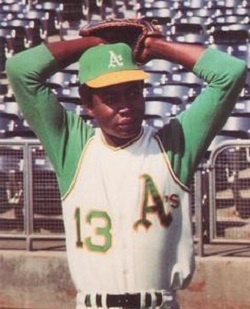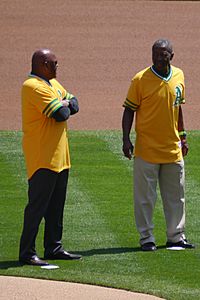Blue Moon Odom facts for kids
Quick facts for kids Blue Moon Odom |
|||
|---|---|---|---|
 |
|||
| Pitcher | |||
| Born: May 29, 1945 Macon, Georgia, U.S. |
|||
|
|||
| debut | |||
| September 5, 1964, for the Kansas City Athletics | |||
| Last appearance | |||
| August 17, 1976, for the Chicago White Sox | |||
| MLB statistics | |||
| Win–loss record | 84–85 | ||
| Earned run average | 3.70 | ||
| Strikeouts | 857 | ||
| Teams | |||
|
|||
| Career highlights and awards | |||
|
|||
Johnny Lee "Blue Moon" Odom (born May 29, 1945) is an American former professional baseball player. He was a right-handed pitcher in Major League Baseball from 1964 to 1976. Odom was a key player for the Oakland Athletics team. This team won three World Series championships in a row from 1972 to 1974. He was also chosen for the All-Star Game twice. Besides the Athletics, he played for the Cleveland Indians, Atlanta Braves, and Chicago White Sox.
Contents
Early Life and Nickname
Johnny Odom got the nickname "Blue Moon" when he was in grade school. A classmate thought his round face looked like the moon. Before playing professional baseball, Odom was a star at Ballard-Hudson High School in Macon, Georgia. He led his high school team to two state championships. His pitching record in high school was an amazing 42 wins and only 2 losses. After graduating, he signed with the Kansas City Athletics.
Blue Moon's Baseball Journey
Starting with the Athletics
Odom began his professional baseball career with the Birmingham Barons. This team was part of the Southern League. After one season, he joined the Kansas City Athletics in September 1964. He made his first major league appearance at just 19 years old. This game was on September 5 at Municipal Stadium in Kansas City.
In 1965, Odom played for the Lewiston Broncs in the Northwest League. He had 11 wins and 14 losses that season. He also led the league in games started and innings pitched. He only played one game in the major leagues that year.
Odom split his time between Kansas City and the minor leagues in 1966. He had a good 2.49 earned run average (ERA) in the major leagues. In 1967, he started with Kansas City but was sent to the minor leagues in July.
Moving to Oakland and Becoming an All-Star
In 1968, the Athletics team moved to Oakland, California. This was also when Odom became a top major league pitcher. He finished the season with 16 wins and 10 losses. His ERA was an excellent 2.45.
On June 7, 1968, Odom almost pitched a no-hitter against the Baltimore Orioles. A single hit in the ninth inning stopped him from achieving it. He was also selected for his first All-Star Game that year. He pitched two innings without giving up any runs.
Odom had an amazing first half of the 1969 season. He had 14 wins and only 3 losses with a 2.41 ERA. He also showed he could hit well for a pitcher. On May 4, he got three hits, including a home run, and drove in six runs. He was named to his second straight All-Star team.
World Series Success with the Oakland Athletics
In 1971, the Athletics won their division. However, they lost to the Baltimore Orioles in the playoffs.
Before the 1972 season, Odom had an accident. He was shot twice while trying to stop a burglary at his neighbor's house. He recovered and had a great season. He won 15 games and had a 2.50 ERA. He was part of a strong pitching team that included Catfish Hunter, Ken Holtzman, and Vida Blue. The A's won their division again in 1972.
Pitching in the World Series
In his first playoff start, Odom pitched a shutout against the Detroit Tigers. He allowed only three hits in Game 2 of the 1972 American League Championship Series. This gave Oakland a 2–0 lead in the series. The Tigers tied the series, and Odom pitched again in Game 5. He allowed only one unearned run in five innings. The A's won the game 2–1.
Oakland then faced the "Big Red Machine" from Cincinnati in the 1972 World Series. Odom pitched in Game 3. He allowed only one hit and two walks in six innings. He gave up his first playoff run in the seventh inning. The Cincinnati Reds won that game 1–0.
Odom and the Reds' pitcher, Jack Billingham, had another close game in Game 7 of the World Series. Odom left the game with Oakland leading 1-0. The A's won the game 3–2, making them World Series champions. This was the first championship for the team since moving to Oakland. In the playoffs, Odom had 2 wins and 1 loss. His ERA was 0.71, and he had 18 strikeouts.
In 1973, Odom's record was 5 wins and 12 losses. However, the A's still made it to the playoffs. Odom pitched in relief during the 1973 playoffs. He made one appearance in the American League Championship Series. He pitched five innings and gave up one run.
Odom also pitched in two games of the 1973 World Series against the New York Mets. In Game 2, he pitched two innings without giving up any runs. In Game 4, he entered the game in the first inning with runners on base. He got an important double play to end the inning. He left the game without giving up any runs. The A's won the World Series again.
In 1974, Odom was used as a relief pitcher. He earned his only career save on August 30. The A's played the Baltimore Orioles again in the playoffs and won. Odom made one appearance in that series.
Just before the 1974 World Series against the Los Angeles Dodgers, Odom had a disagreement with teammate Rollie Fingers. Despite this, Odom pitched well in the World Series. He pitched a scoreless ninth inning in Game 2. He also earned the win in Game 5. Odom faced one batter in the fifth and final game. The A's then scored a home run to win the game 3–2, giving Odom the win. This made the A's World Series champions for the third year in a row.
Later Career and No-Hitter
In 1975, Odom played only seven games for the A's. He was then traded to the Cleveland Indians. After a month, he was traded again to the Atlanta Braves. He had a tough year, with 2 wins and 9 losses across his three teams.
Odom started the 1976 season in the minor leagues for the Atlanta Braves. He returned to the major leagues after being traded to the Chicago White Sox on June 15. In his second start for the White Sox, on July 28, Odom helped pitch a no-hitter against his old team, the Oakland A's. Odom pitched the first five innings, and Francisco Barrios finished the game. This was Odom's last major league victory.
Odom played six more games in the minor leagues in 1977 before he retired. In 2008, he was asked to represent the Athletics at the First-Year Player Draft.
Career Stats

| W | L | PCT | ERA | G | GS | CG | SHO | SV | IP | H | ER | R | HR | BB | K | WP | HBP | Fld% |
| 84 | 85 | .497 | 3.70 | 295 | 229 | 40 | 15 | 1 | 1509 | 1362 | 620 | 708 | 103 | 788 | 857 | 92 | 36 | .904 |
Blue Moon Odom was a great athlete. He was used 105 times as a pinch-runner in games. He was also a good hitter for a pitcher, with 12 home runs and a .195 career batting average. In the playoffs, Odom had a career record of 3 wins and 1 loss. His ERA was 1.13, and he had 27 strikeouts.
Legacy
Blue Moon Odom was inducted into the Georgia Sports Hall of Fame in 2004.
| Preceded by Larry Dierker |
No-hitter July 28, 1976 (with Francisco Barrios) |
Succeeded by John Candelaria |

